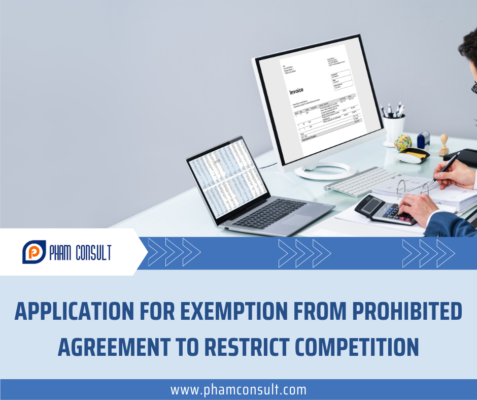In the advancement of the current market economy, the gradual elimination of trade barriers in the process of international economic integration has created a new and increasingly fierce competitive environment. Competition puts considerable pressure on business development, reducing profits and increasing business costs. Therefore, many businesses have sought to cooperate and agree with each other on factors such as price, output, market, customers and other factors to increase the ability to control the market and minimize costs. costs and maximize profits. These agreements are often called “anti-competitive agreements” under the laws of countries. However, the consequence of this is the distortion of the free competitive environment, changing the supply-demand balance and losing the regulation of the market economy. Therefore, State intervention is necessary to ensure fair competition, for the benefit of consumers and to create motivation for businesses to constantly improve and modernize production processes and lower costs. Low product cost. However, not all agreements restricting competition have negative meanings and negative impacts on the domestic market. In parallel, there are still restrictive agreements that bring positive benefits to the economy. , to better ensure the rights of consumers, these agreements will enjoy exemptions according to the provisions of law. Accordingly, in this article, Pham Consult will introduce in detail the provisions of anti-competitive agreements and exemption conditions.

Relevant legal documents:
• Competition Law 2018
• Decree 35/2020/ND-CP
1. Concept of anti-competitive agreement:
– The Competition Law 2004 did not provide any definition of anti-competitive agreements. At that time, the concept of this term was only introduced by researchers with the view that it was “unified action” between two or more businesses.
– By 2018, when the 2018 Competition Law was born with many new breakthroughs, the definition of anti-competitive agreement was also stipulated for the first time in Clause 4, Article 3:
“Agreement to restrict competition is an agreement between parties in any form that affects or has the potential to affect competition.”
– Through this definition from lawmakers, the term “agreement” is not only limited to written form but should be understood in a broad sense as an agreement in all possible forms: words, actions. impact,… The result of an agreement to limit competition is to make implicit decisions, compliance commitments, etc. to “affect or potentially impact competition”. For example: It could be a price fixing commitment between two or more businesses in the same related market to prevent, restrain and eliminate from the market competitors who do not participate in the agreement.
– The consequence that anti-competitive agreements bring is an unfairly competitive market, limiting the choices of market participants such as customers.
2. Agreements that restrict competition are prohibited:
– According to the provisions of Articles 11 and 12 of the Competition Law 2018, anti-competitive agreements can be divided into 03 groups including:
• Group 1: Agreements that restrict competition are automatically prohibited. These are agreements that restrict competition between businesses in the same related market without considering whether the agreement has or is likely to cause an anti-competitive impact or not:
Agreement to fix prices of goods and services directly or indirectly
Agreement to divide customers, divide consumer markets, supply sources of goods, and provide services
Agreement to limit or control the quantity and volume of production, purchase, sale of goods and provision of services
• Group 2: Agreements that restrict competition are absolutely prohibited. These are prohibited acts regardless of whether the businesses performing the acts are in the same relevant market or not because these agreements always have a negative impact on competition and the market, causing damage to people. Consumers and stakeholders:
Agreement for one or more parties participating in the agreement to win the bid when participating in bidding for the provision of goods and services.
Agreement to prevent, restrain, or prevent other businesses from entering the market
The agreement eliminates from the market businesses that are not parties to the agreement
• Group 3: Agreements to restrict competition are prohibited conditionally. In addition to the anti-competitive agreements belonging to the above two groups, the restrictive agreements in this group are implemented by business enterprises at different stages in the production, distribution and supply chain for goods. A certain type of goods or service is only prohibited when it causes or has the potential to cause a significant restriction of competition in the market:
Agreement to fix prices of goods and services directly or indirectly
Agreement to divide customers, divide consumer markets, supply sources of goods, and provide services
Agreement to limit or control the quantity and volume of production, purchase, sale of goods and provision of services
Agreement to limit technical and technological development and limit investment
Agreement to impose or fix conditions for signing contracts to purchase or sell goods or provide services to other businesses or agreements to force other businesses to accept obligations not directly related to the subject of the contract. copper
Agreement not to transact with parties not participating in the agreement.
The agreement limits the product consumption market, goods supply, and service provision of parties not participating in the agreement.
Other agreements that cause or have the potential to cause anti-competitive effects.
And how to evaluate the impact or ability to cause anti-competitive effects of a anti-competitive agreement is specifically stipulated in Article 13 of the Competition Law 2018 and Decree No. 35/2020/ND-CP
3. Purpose of prohibiting anti-competitive agreements:
– Competition is the environment and the driving force to promote equal development of all sectors in the market economy. Besides, competition is also an important condition to develop productive forces, bring increasing scientific and technical progress into production, and modernize the social economy. Therefore, protecting competitive efficiency is protecting the sustainable development of the economy
4. Exemption provisions for prohibited anti-competitive agreements:
– However, although these agreements affect competition in the market, as Pham Consult stated above, there are still agreements that bring greater benefits than the disadvantages caused by competition restrictions. It can be said that exempted anti-competitive agreements are agreements that, although they cause anti-competitive consequences, at the same time, the benefits to consumers, the market and the economy that they bring are large. than the consequences. Therefore, the Competition Law 2018 has stipulated in Article 14 cases to help businesses participating in this agreement have the opportunity to be exempt from time-limited sanctions according to the provisions of law.
– Specifically, agreements that restrict competition but benefit consumers and are exempt must meet the following conditions:
Impact of promoting technical and technological progress, improving the quality of goods and services
Enhance the competitiveness of Vietnamese enterprises in the international market;
Promote the uniform application of quality standards and technical norms of product categories;
Agree on conditions for contract performance, delivery, and payment, but not related to price and price factors.
5. Documents and procedures for submitting applications for exemption from prohibited anti-competitive agreements:
– Legal basis: Article 15 of the Competition Law 2018
– Enterprises that intend to participate in prohibited anti-competitive agreements but are exempted will submit an application for exemption to the National Competition Commission.
– Documents requesting exemption from prohibited anti-competitive agreements include:
Application according to the form issued by the National Competition Commission;
Draft agreement content between parties;
A copy of the Business Registration Certificate or equivalent document of each enterprise participating in the prohibited competition restriction agreement; copy of the Charter of the industry association in case of prohibited anti-competition agreement with the participation of the industry association;
Financial statements of each enterprise participating in prohibited anti-competitive agreements for 02 consecutive years immediately preceding the year of submitting the application for exemption or financial statements from the time of establishment to the time of submission The application for exemption for newly established enterprises must be certified by an auditing organization according to the provisions of law;
Report specifically explaining the satisfaction of regulations in Clause 1, Article 14 of this Law, accompanied by evidence to prove it;
Authorization document of the parties participating in the prohibited competition restriction agreement for the representative party (if any).




 VI
VI